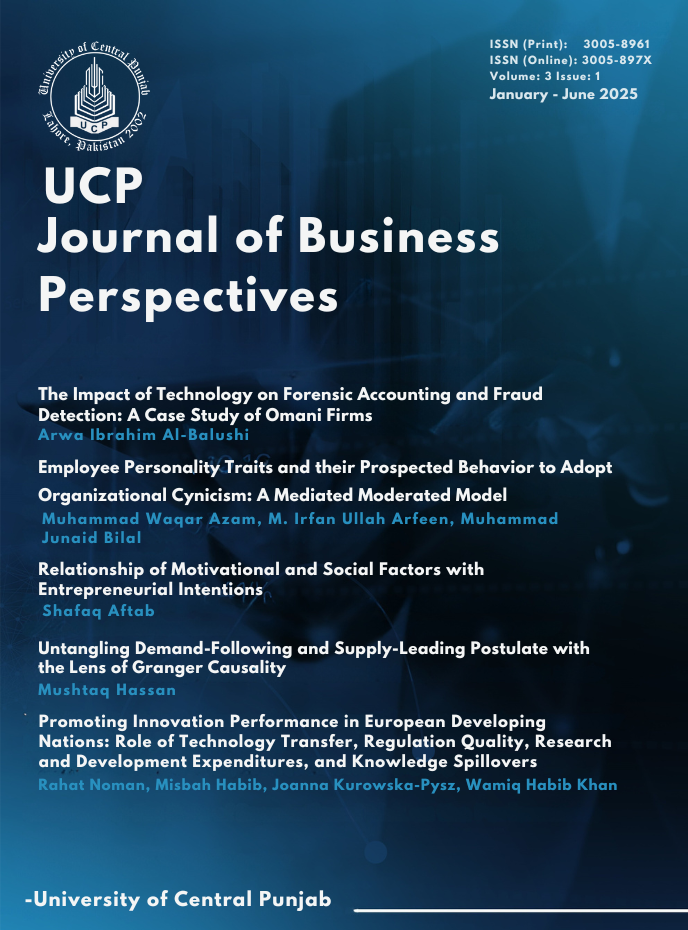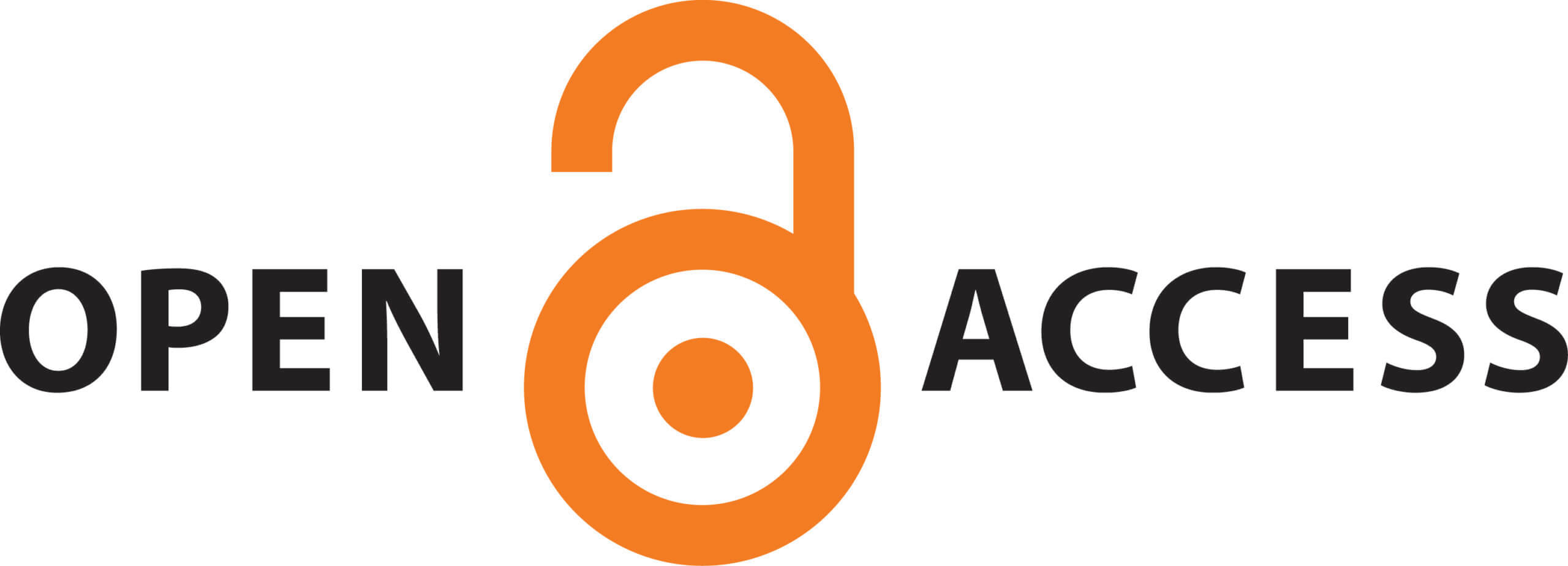Archives
-

UCP Journal of Business Perspective
Vol. 1 No. 2 (2023)Organizations in the dynamic global business world encounter many obstacles that require creative solutions and thoughtful analysis. To stay competitive in today's ever-changing marketplace, businesses must constantly adapt to new technologies and evolving consumer preferences. This editorial presents a comprehensive overview of the various research articles showcased in this volume. Each article offers valuable insights into important issues and emerging trends within business studies. From examining the influence of digital transformation in the banking industry to studying the impact of different rewards on employee job satisfaction, the accepted papers encompass a broad range of subjects pertinent to modern business settings. The study by Ullah et al. explores the shift from conventional banking practices to integrating digital financial services, explicitly emphasizing the implementation of RAAST by the State Bank of Pakistan. This study reveals detailed insights into customer perceptions and identifies the crucial factors that impact the adoption of digital financial services in Pakistan. Anwar et al. investigated the effects of intrinsic and extrinsic rewards on job satisfaction within manufacturing and services companies. Their thorough analysis offers valuable insights for senior management to improve employee job satisfaction and enhance organizational performance by implementing effective reward systems. The study by Latif and Kashif provides a comprehensive analysis of the 2008 financial crisis and its effects on Islamic banks in Pakistan. They shed light on these banks' financial performance and resilience in economic turbulence. Their study enhances our comprehension of the dynamics and performance of Islamic banking in challenging economic conditions. Likewise, the study by Iqbal analyzes the influence of conversion on deposits and operational costs of Faysal Bank, offering valuable insights into the consequences of shifting from conventional to Islamic banking. This study provides significant insights for banks worldwide going through similar conversion processes. Finally, Shahid et al. delve into Pakistan's economic theory of crime, examining the correlation between socioeconomic factors and crime rates. Their research findings provide valuable insights into the factors influencing criminal behavior and offer essential considerations for policymakers addressing social and economic challenges.
-

UCP Journal of Business Perspective
Vol. 2 No. 1 (2024)The current issue of UCP-JBP showcases a wide range of research that tackles diverse modern challenges in different knowledge and practice domains. The research articles in this edition demonstrate a profound dedication to comprehending and enhancing the methodologies employed in financial institutions, legal professions, educational settings, and societal dynamics. The first study explores the ongoing problem of second-generation gender bias among female lawyers, a crucial topic in the current discussion on gender equality in the legal field. Through an in-depth examination of the various elements at work, this study illuminates the obstacles that impede women's progress in the legal profession, particularly in societies shifting away from patriarchal norms. The second paper explores the challenges of the post-COVID-19 era, explicitly focusing on the effects of social media usage on students' academic performance and mental well-being. The study's findings highlight significant concerns regarding the negative impact of excessive social media usage and acknowledge its potential to enhance scholarly productivity. These studies significantly contribute to their fields, offering theoretical advancements and practical recommendations that will interest academics, practitioners, and policymakers. From the organizational behaviour perspective, the third study investigates the effects of participative leadership style on employee performance, specifically within educational institutions. The findings highlight the significance of promoting employee learning as a mediator, thus connecting leadership theory and practical application to improve organizational performance. Expanding the scope further, the fourth paper delves into the financial efficiency of Islamic banking branches compared to their conventional counterparts. It provides valuable insights into the strategic decision-making processes of traditional banks considering the establishment of Islamic branches. This research is important given the increasing attention paid to Islamic financial practices and the State Bank of Pakistan’s active support for Islamic finance. The fifth paper examines how fintech and financial inclusion can help reduce income inequality. This study showcases the immense potential of cutting-edge financial services in fostering economic equality, underscoring the importance of targeted investments in research and development to capitalize on the advantages of financial technology fully.
-

UCP Journal of Business Perspective
Vol. 1 No. 1 (2023)In a rapidly changing globalized world, marked by evolving competing and collaborative economic frontiers, and intricate organizational models, a holistic understanding of key driving forces is critical to shaping theories and practice for the future. Through its research articles, the inaugural edition of the UCP Journal of Business Perspectives (UCP-JBP) seeks to provide readers with a panoramic view of various domains, shedding light on local and global landscapes. Each article's substantive conceptual, theoretical, methodological, or applied perspective advances our understanding of management knowledge, covering many organizational factors. To sum up, the first issue of UCP-JBP makes a robust attempt to open new avenues for academic scholars and policy-makers through multifaceted ideas covering economics, workplace behaviors, education, and banking. The readers are encouraged to build on themes in contemporary management knowledge to create and share inclusive research ideas for the future.
-

UCP Journal of Business Perspectives
Vol. 3 No. 1 (2025)This issue features a diverse collection of empirical and theoretical studies that explore the pressing challenges and emerging opportunities in technology adoption, organizational behavior, and economic growth. The research included offers valuable insights into the dynamic business environment, highlighting the importance of innovation, human factors, and strategic policy in shaping future business practices. A recurring theme throughout this issue is the link between technology and organizational performance. The adoption of advanced technologies such as AI, Blockchain, and Machine Learning is transforming fields like forensic accounting and fraud detection. These developments not only improve accuracy and efficiency but also emphasize the need for ongoing training and cybersecurity investments to address implementation challenges. Additionally, the issue examines how employee personality traits influence organizational behavior, illustrating how traits like conscientiousness and honesty-humility affect organizational commitment and reduce cynicism. These findings are particularly useful for HR professionals and policymakers seeking to foster a positive work environment. The issue also investigates the key motivational and social factors that motivate entrepreneurial intentions, highlighting the importance of family support and peer encouragement in developing new ventures. The connection between financial development and economic prosperity is also explored, focusing on how microfinance and improvements in the financial sector can boost growth in emerging markets. Lastly, the issue discusses the role of FDI and technology transfer in enhancing innovation among European developing nations, stressing the need for strategic investments in human capital and R&D to promote innovation. Collectively, these studies underscore the value of taking a multidimensional approach to strategic decision-making—integrating technological innovation, organizational behavior, and economic development—to foster sustained growth and resilience in an increasingly complex global economy.







